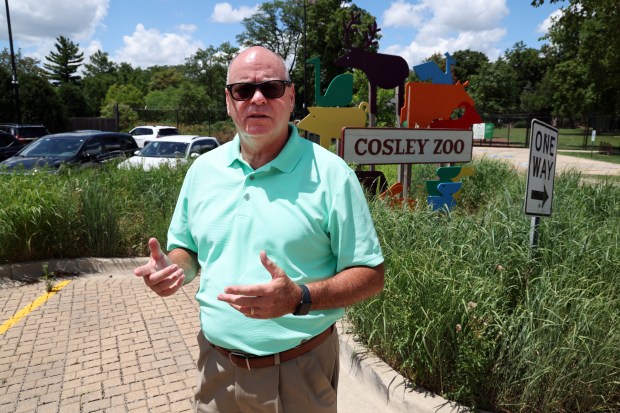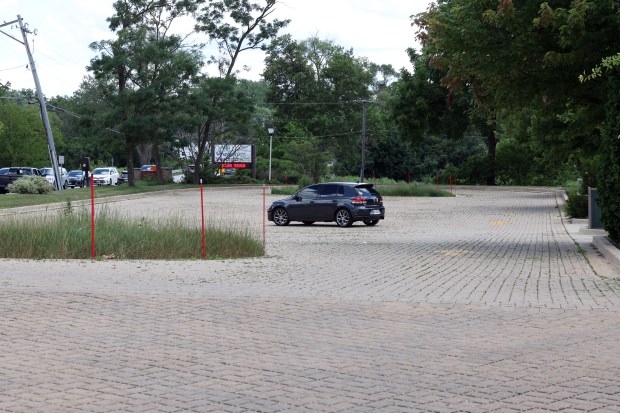For the past year, plans for additional parking space to serve overflow visitors to Wheaton’s Cosley Zoo have drawn the ire of neighbors, who worry about the impact the proposal will have on the mostly residential area.
The nearby residents have filled Wheaton Park District and Wheaton City Hall meeting rooms and now have gathered the required number of signatures to place an advisory referendum question on the measure on November ballots.
On Monday night, however, the proposed 93-space parking lot moved one step closer to fruition when the City Council voted 5-1 in favor of it.
Fifty-year-old Cosley Zoo sits on 4 acres at 1356 Gary Ave. in Wheaton and has another adjoining acre for its current 80-space parking lot. Land for the zoo, according to its website, was donated in memory of Harvey Cosley, a previous landowner.
The zoo has 20 exhibits that house more than 200 animals, representing more than 50 species, according to the website.
Park District representatives have said that studies have shown that on more than one-third of the days each year, the zoo’s parking lot is full at some point during the day.
Last year, the Park District unveiled plans for a new 258-space parking lot on district-owned land across busy Gary Avenue from the zoo. In October, the district updated its plan for a smaller lot of 150 spaces, and then in December, the district proposed 73 spaces on that land, with the ability to add another 77 spots later. Then, shortly after hearings started in March before the Wheaton Planning and Zoning Board, the district revamped its plan further, offering a 93-space parking lot, with greater setbacks for additional green space.
On May 29, Wheaton’s Planning and Zoning Board voted 5-0 to recommend approval of the plan, leading to the City Council’s vote to proceed. Final council approval is scheduled to take place July 15.
Monday’s vote disappointed neighbors in the Pioneer Terrace subdivision, which adjoins the 6.1 acres that the Park District owns on the east side of Gary. Right now, most of the land is vacant, apart from a storage barn and an animal welcome center on the northernmost portion. A current 30-space parking area would be removed, so there would be a net increase of 63 parking spaces on that site.
Neighbors contend that the project would jeopardize safety, as more potential zoo visitors would have to cross Gary to reach the park. They also expressed concerns about flooding and drainage issues and potential negative impacts on their property values. The new lot would be closer to homes than the current 30-car lot, residents point out.
Park representatives countered that the work would not be allowed to begin until after Wheaton finishes planned improvements to Gary Avenue, including adding a traffic signal at Cosley that would enhance safety, and park engineers have concluded that the proposed parking lot would not worsen flooding issues in the area.
“The Park District board has significantly reduced the size of this project after taking the comments received from the public and is only adding 63 spaces via permeable pavers to what we already have on the east side of Gary,” the district’s attorney, Phillip Luetkehans, told the council.
“The Park District will maintain well over 50 percent of the property closest to the neighbors as permanent green space outside of the fence line,” Luetkehans said. “And after listening and watching two experts who testified on property values, there can be no doubt that the only credible testimony is of the … Park District’s expert, who testified conclusively and strongly that there would not be a diminution of property values especially when compared to the uses already allowed.”
Many neighbors were not swayed.
“You cannot sit there and tell me that living next to a parking lot will increase the value of my home,” said neighbor Kevin Needham. “It’s common sense. … The new parking lot will reduce the value of surrounding properties. One of the purposes of the Wheaton zoning ordinance is to conserve the values of properties throughout the city of Wheaton. We presented evidence … that the parking lot will reduce the value of adjoining properties including ours by 9 percent to 11 percent. The Park District’s assertion that the new parking lot will have no adverse impact on home values is utterly absurd.”
Another zoo neighbor, Paula Smith, took issue with zoo visitors needing to cross Gary Avenue, even once a stoplight and crosswalk are installed.
“Whether or not (a traffic light and crosswalk) is sufficient to reduce the safety risk to general pedestrian traffic … common sense alone tells us it’s not enough to protect small children,” Smith said. “Is there a plan to provide crossing guards during all Cosley Zoo open hours to protect and assist families attempting to cross Gary Avenue? Those who are opposed to the proposed parking lot fear it is inevitable that a small child visiting the zoo will suddenly dart out into the traffic on Gary Avenue and be injured or killed.”
And John Patterson, who is part of the residents’ group opposing the parking lot, questioned the need for the project.
“What has bothered me the most is the lack of data that the Park District is using to show that the parking lots … (are) filled for one third of the year,” Patterson said. “That is simply not true. A small portion of our group started monitoring parking lots for employees and zoo patrons since December, and we proved that the parking lots have not been full.”

Most City Council members, however, said they appreciated the Park District’s efforts to scale back the plan in response to feedback, and pointed out that their job was to simply consider the zoning question, and not on other factors such as property taxes or whether a project is truly needed.
“The Park District … deserve(s) a lot of credit for being nimble on this project. Once they received feedback, they were quick to turn it around,” said Councilman Michael Barbier. “And this doesn’t seem like an out-of-the-ordinary use.”
Councilwoman Erica Bray-Parker, who also voted in support of the plan, expressed concerns about the Park District’s actions throughout the process, but noted that the city’s role was narrow and strictly confined to zoning.
“The district’s final plan has in fact addressed the safety concerns and this final plan also has addressed the environmental impact concern,” she said. “So now as the Park District moves forward both with the parking lot and with the larger plans for Cosley Zoo, my hope would be that there would be a lot more positive engagement between the Park District and the residents.”
And Wheaton Mayor Philip Suess called the current plan “a dramatic improvement over what was originally proposed, to the credit of everyone.”
After the council’s expected final approval on July 15, the parking lot issue will remain front and center in Wheaton, as an advisory referendum regarding the project will appear before voters in November.
Councilman Scott Brown, who was the lone council member to vote against the plan, urged his colleagues to hold off until after the November referendum question and called the application process and the relations between the Park District and the neighbors “a bad collaboration” and “a mess.”
“What’s the urgency?” he asked. “Let’s validate the data on the parking and then let the people vote. What’s the urgency? I haven’t heard it — maybe it exists, but I haven’t heard it, so why do it? Why press us into this?”
The project’s estimated $2.1 million price tag would be funded entirely by the zoo’s foundation. As a result, no taxpayer money would be used for design or construction.
After the meeting, Patterson said his group has not yet decided on next steps beyond the advisory referendum question.
Bob Goldsborough is a freelance reporter.




